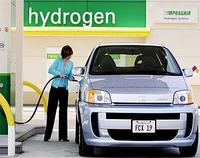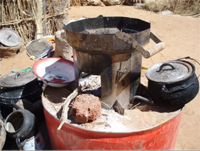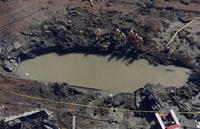-
Hybrid power plants: cost effective way to go green
Hybrid cars, powered by a mixture of gas and electricity, have become a practical way to “go green” on the roads; now researchers at Tel Aviv University are using the hybrid approach to power plants as well
-
-
Hydrogen use as fuel source may be near

Researchers say that our cars may soon be running on an abundant, environmentally friendly fuel generated from the surrounding atmosphere; the researchers demonstrated how such a fuel — in this case, hydrogen — can be stored in metals
-
-
Safe, efficient cookstoves for earthquake survivors

316,000 people were killed and more than one million made homeless by the 12 January 2010 magnitude 7.0 quake that left the capital city of Port-au-Prince in ruins; many of the displaced Haitians still live in tent cities, where even simple tasks such as cooking are a challenge; scientists hope to find the safest and most energy-efficient way for earthquake survivors to cook
-
-
Carbon abatement technologies compete for prizes
The U.K. Technology Strategy Board is investing up to £4.5 million in carbon abatement technologies (CATs), centered mainly on innovative projects with strong elements of technology demonstration; to select the technologies, the TSB is holding a competition
-
-
Swiss nuclear energy phase-out possible

In the wake of Germany’s decision to abandon nuclear power generation, other countries have also been examining that option; a respected Swiss research center looked into the mater, finding that restructuring the Swiss energy system without nuclear power by 2050 is in principle technologically possible and economically manageable
-
-
The Geophysicist's Guide to Striking It Rich
Prospecting — the search for valuable reserves such as gold, diamonds, and natural gas — is not just a matter of luck; it is about knowing where to look; now researchers at Tel Aviv University have modernized the hit-or-miss search with advanced technology that scans the earth for signs of lucrative resources that could lurk beneath the surface
-
-
Report finds poor management cause of San Bruno natural gas explosion

An investigation into the cause of a natural gas pipeline explosion that killed eight people and destroyed dozens of homes in San Bruno, California, placed the blame squarely on fifty-four years of bad management by Pacific Gas & Electric Company (PG&E) and the failure of state and federal regulators to notice the problem
-
-
Breakthrough in hydrogen fuel cells

Hydrogen makes a great fuel because it can be converted easily to electricity in a fuel cell and because it is carbon free; the downside of hydrogen is that, because it is a gas, it can only be stored in high pressure or cryogenic tanks; a team of USC scientists has developed a robust, efficient method of using hydrogen as a fuel source
-
-
U.S. makes nuclear fuel available to other countries
The United States announced the availability of a reserve stockpile of low-enriched uranium (LEU) for use in nuclear fuel; the LEU is derived from down-blended surplus military material; the LEU will be made available to countries interested in nuclear power generation, thus making it unnecessary for these countries to develop their own uranium-enrichment technology
-
-
Thermopower waves advance a new energy future
Thermopower waves in thermoelectric materials can convert heat from solid fuels into electrical energy, in research that advances the vision of “smartdust” and other truly autonomous micro and nanomachines; “smartdust” systems are micro-electromechanical systems that are networked wirelessly for sensing and receiving data, for example testing pH of soil in large agricultural fields or quality of water reserves
-
-
Bacteria--Energy Producers of the Future?
A lot of the water we use daily goes to waste — whether it goes down drains, sewers, or toilets, much of it ends up at a wastewater treatment plant where it undergoes rigorous cleaning before it flows back to the environment; researchers are looking at processes which would turn wastewater into energy
-
-
Tap water in Copenhagen contaminated with E.coli
Parts of the Danish capital Copenhagen were without clean drinking water Saturday after high levels of the E.coli bacteria were detected in the municipal tap water system
-
-
Cleaning water while generating energy
A fuel cell system that can generate electricity from organic compounds and clean up wastewater at the same time has been developed by scientists in China; the cell uses light energy to degrade organic compounds in wastewater, generating electrons that pass through to the cathode, which converts the chemical energy into electrical energy
-
-
Day of "solar" soldiers nears

Researches develop wearable light-weight solar panels which will allow soldiers to generate power in the field and reduce the need for batteries for their electronic devices; they will also establish a power supply that keeps electronic devices operational throughout the duration of missions
-
-
Storing CO2 underground to extract electricity
A team of scientists, led by the Berkeley Lab, hopes to become the first in the world to produce electricity from the Earth’s heat using CO2; They also want permanently to store some of the CO2 underground, where it can not contribute to climate change
-
More headlines
The long view
Strengthening the Grid’s ‘Backbone’ with Hydropower
Argonne-led studies investigate how hydropower could help add more clean energy to the grid, how it generates value as grids add more renewable energy, and how liner technology can improve hydropower efficiency.
LNG Exports Have Had No Impact on Domestic Energy Costs: Analysis
U.S. liquified natural gas (LNG) exports have not had any sustained and significant direct impact on U.S. natural gas prices and have, in fact, spurred production and productivity gains, which contribute to downward pressure on domestic prices.
